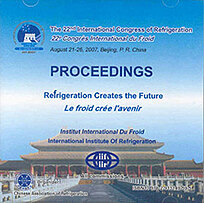
IIR document
Life cycle analysis of microchannel technology and compact heat exchangers for refrigerating units.
Author(s) : YOUBI-IDRISSI M., LEDUCQ D.
Summary
In refrigerating and air-conditioning fields, the environmental performances of systems are frequently evaluated by using the TEWI indicator (Total Equivalent Warming Impact). Alone the greenhouse effect is taken into account from this widespread index which seems nevertheless to be inadequate for a global characterisation, including whole environmental impacts of a refrigerating machine during its life, i.e. from cradle to grave. In this article, the authors propose to apply the life cycle analysis approach to compare two refrigerating units, destined to an agro-food small application, having the same characteristics of refrigerating capacity and use the same refrigerant (R-404A). After a detailed life cycle inventory of both systems, the analysis results show that the use of the micro-channel technology and compact heat exchangers in such sector is energetically and environmentally friendly. It provides an energy saving, a low refrigerant charge, a significant CO2 emissions reduction (division by 3), in addition of an important decrease of other environmental impacts in terms of human health (33%), ecosystem quality (24%) and resources depletion (25%).
Available documents
Format PDF
Pages: ICR07-B2-270
Available
Public price
20 €
Member price*
Free
* Best rate depending on membership category (see the detailed benefits of individual and corporate memberships).
Details
- Original title: Life cycle analysis of microchannel technology and compact heat exchangers for refrigerating units.
- Record ID : 2008-0418
- Languages: English
- Subject: Environment, General information
- Source: ICR 2007. Refrigeration Creates the Future. Proceedings of the 22nd IIR International Congress of Refrigeration.
- Publication date: 2007/08/21
Links
See other articles from the proceedings (839)
See the conference proceedings
Indexing
-
Themes:
Evaporators, condensers and other heat exchangers;
General information on environment (climate change, ozone depletion…);
Refrigerant circulation: piping, control, automation, safety - Keywords: TEWI; Refrigerating system; Energy consumption; Microchannel; Lifetime; Material; Environment; Air conditioning; Heat exchanger
-
Use of HFC-410A in refrigeration plants to redu...
- Author(s) : RIVET P.
- Date : 2009/04/06
- Languages : English
- Source: RCR 2009. 1st IIR Workshop on Refrigerant Charge Reduction in Refrigerating Systems.
- Formats : PDF
View record
-
Refrigeration system with integrated liquid lin...
- Author(s) : LEDUCQ D., ROCHE C., MACCHI-TEJEDA H., et al.
- Date : 2009/04/06
- Languages : English
- Source: RCR 2009. 1st IIR Workshop on Refrigerant Charge Reduction in Refrigerating Systems.
- Formats : PDF
View record
-
Low charge refrigeration systems: thermodynamic...
- Author(s) : FEIDT M., BOUSSEHAIN R., KHEIRI A.
- Date : 2009/04/06
- Languages : English
- Source: RCR 2009. 1st IIR Workshop on Refrigerant Charge Reduction in Refrigerating Systems.
- Formats : PDF
View record
-
Ökoeffizienzbetrachtungen von Supermarktkältean...
- Author(s) : DIEHLMANN A., JAKOBS R., MEURER C.
- Date : 2005/11/16
- Languages : German
- Source: DKV-Tagungsbericht 2005, Würzburg./ 2005 Proceedings of the DKV Conference, Würzburg.
View record
-
Application of global temperature potential to ...
- Author(s) : COLBOURNE D., SUEN K. O.
- Date : 2004/08/01
- Languages : English
- Source: Natural Working Fluids 2004: 6th IIR-Gustav Lorentzen Conference
- Formats : PDF
View record
